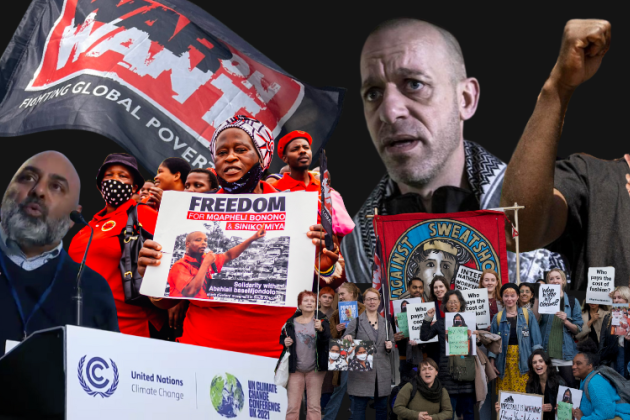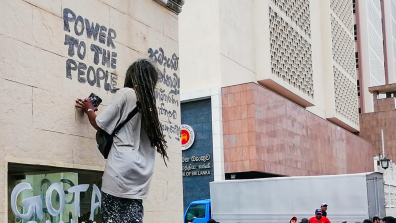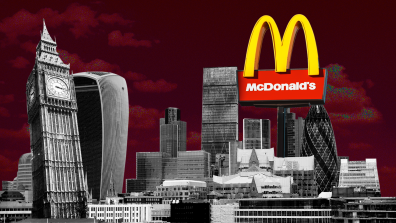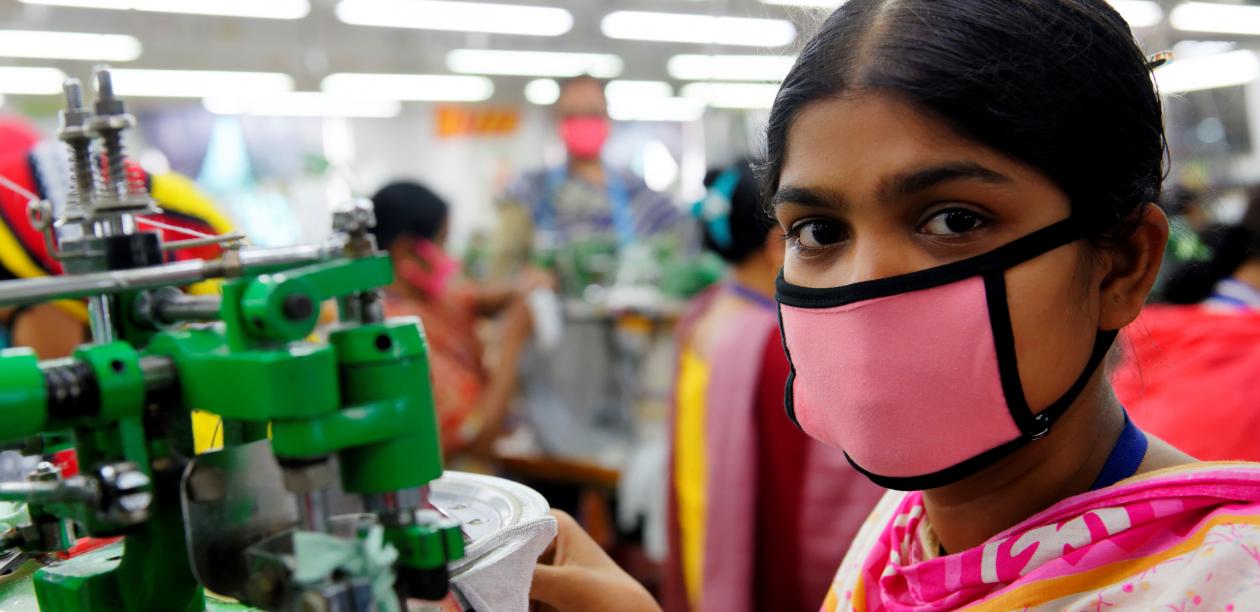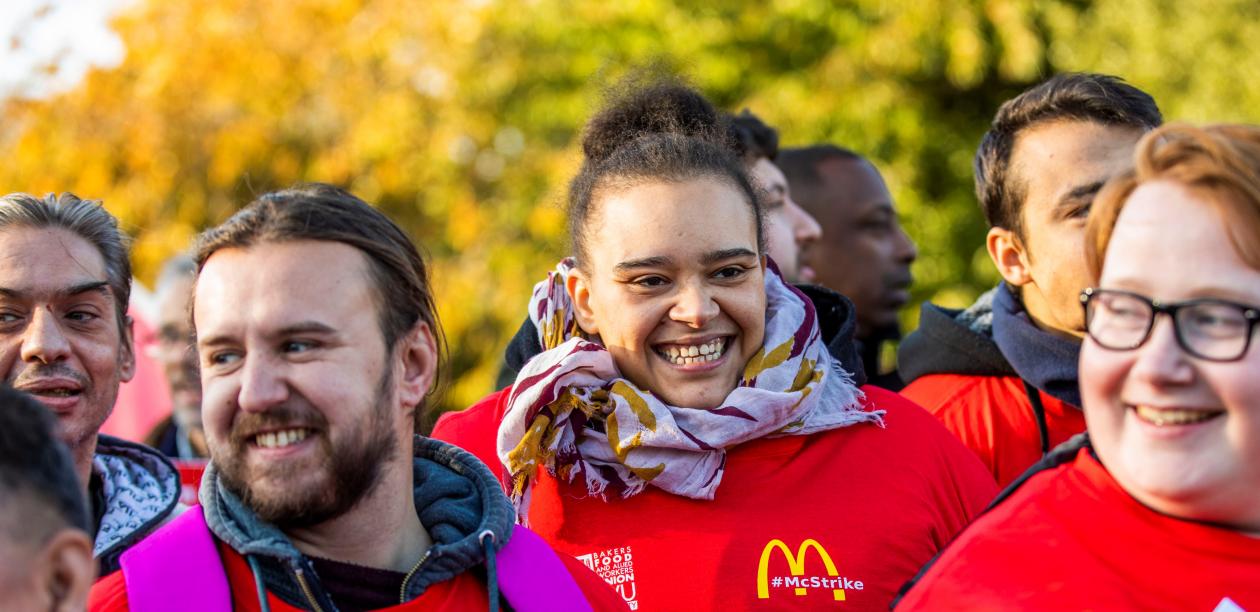Seventy years fighting against global poverty
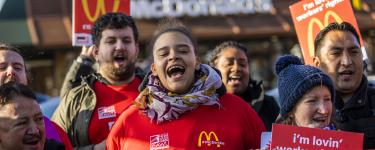
Article published in Labour Research magazine, February 2021
War on Want brings something very distinct from what would normally be understood as charitable action. It brings together groups of workers from across the world to fight against common systems and structures and to benefit from that solidarity.
The organisation’s director, Asad Rehman, describes the way it links the union movement with social and climate justice movements, for example, as “the connective tissue War on Want is able to bring”. Its economic justice senior campaigner Owen Espley says War on Want “provides a bridge between people taking action in the UK and our partner social movements and trade unions overseas fighting similar struggles.”
“Those connections can reinforce and strengthen both sets of struggles, even though we acknowledge that the challenges our partners face are of a magnitude and depth that puts them in a different league. It’s still possible to build solidarity.”
Neoliberalism
It was also one of the first charities to talk about the impact of neoliberalism and the way it is decimating and deregulating the UK labour market in the same way it has already impacted the global South. One of its straplines is “Poverty is political — the world needs justice not charity”.
Rehman said: “You see the same process of precarious work, poverty pay and who that benefits — the corporations— and their influence on governments.
“We’re always trying to draw parallels and show that, actually, this is not a simple fight within one country. This is a system that’s being imposed and working people are ultimately paying the highest price.”
Some of the “bigger strategic conversations” it is currently engaged in include arguing that responses to this moment of multiple crises — the COVID pandemic, the recession it’s triggered and the climate crisis — must put workers centre stage.
“We’re saying the only way you are going to get the social licence for the necessary transition — a just transition — is to include jobs guarantees, social protections, the Living Wage and public services,” he added.
Roger McKenzie, UNISON public services union assistant general secretary, is a long-time War on Want supporter and now sits on its council of management (CoM).
He said one of War on Want’s many strengths is that it “doesn’t just talk about solidarity”. Instead, it “builds partnerships, alliances and links in order to provide practical action to support workers”.
One example of this was its work in Western Sahara with the FBU firefighters’ union in the 1980s. War on Want trades union officer Jackie Simpkins explained: “Morocco invaded Western Sahara with a view to holding a referendum on whether the Saharawi people wanted to become Moroccan, which clearly they didn’t.”
The Saharawi people were obliged to move to an inhospitable desert to the south west of Algeria. As part of War on Want’s continued work in Western Sahara, the FBU took their expertise and fire tenders and set up air-conditioned warehouses where food could be kept for them.
“For many, many years the refugee camp in Tindouf in Algeria has continued to thrive,” said Simpkins. “That was never part of the plan but is a wonderful case of practical solidarity.”
Another campaign she highlights involved UK transport unions and the global transport workers’ ITF federation in the early 2000s.
“We ran a ‘sweat ships’ campaign to highlight the working conditions of people on cruise ships that people were paying thousands of pounds to go on,” she said. “It was a predominantly Filipino workforce who were having their passports confiscated before going onto the ships.
“We managed to bring over a Filipino worker to speak to the TUC in Blackpool and we already had the transport unions working with us, including the RMT which organises on ferries.”
Espley says this internationalism is an “incredibly special” aspect of what the organisation brings to campaigning. War on Want identifies where there is “commonality of struggle”.
Tax dodging
For example, it linked the PCS civil service union’s campaign against public service austerity cuts, including in the HMRC tax department, to the global issue of tax dodging.
The organisation’s CoM chair and former PCS head of equalities Norina O’Hare says both organisations were early proponents of tax justice.
“With the help of a successful War on Want project bid for European Union funding, and working in partnership with the European public services confederation EPSU, we ran an educational programme to take the campaign to trade unions across Europe,” she told Labour Research.
“Tax dodging by multinational companies and the need to tackle this was taken up with the European Commission. The funding also meant the union could reach out to other parts of the world — we met union leaders from Ghana for example — about the importance of tax systems and tax in general for public services funding.”
And from day one, the organisation understood the need to build what some now describe as intersectional responses.
Grunwick
Rehman said: “We heavily supported the Grunwick strike [by South Asian women at a London photo processing plant in the late 1970s] for example, because we understood it was important to bring a race and class analysis.”
This is still prevalent in the work Espley and others are doing around precarious work and migrant workers.
“Globalisation and the role of multinationals and their supply chains is a very, very important part of the fight,” said Rehman. “You can’t defeat their power if you are only operating and taking the fight site battle by site battle. Our job was always: how do we weave site battles into the bigger story of international solidarity?”
The current campaign War on Want is running with the GMB general union and the Make Amazon Pay coalition, demonstrates how the organisation is always looking at what it can do to strengthen the labour movement in the UK and overseas — and how it can “make workers see beyond the factory gate and beyond the nation state”.
O’Hare says another War on Want strength is taking on issues before they actively hit mainstream consciousness. She pointed to the example of its work with partner textile unions on the Bangladesh Accord on Fire and Building Safety (see Labour Research, May 2018, page 22) and fashion retailers’ supply chains to improve health and safety.
This, she said, “highlighted the need for labour and union rights in garment factories long before fast fashion became such a huge issue”.
And Simpkins said War on Want was working with partners to organise workers in the informal economy in the global South when few people in the UK really understood what this meant.
“Now — and it’s not exactly the same here of course, again it’s a different order of magnitude — we have the same system of precarious work and zero hours contracts in the UK where you might not even have what you formally recognise as an employer,” she said.
Links
“That doesn’t mean to say you can’t have solidarity and it doesn’t mean to say you can’t fight for collective bargaining. That’s where we bring the links and that’s where the labour movement is so intrinsic to our values and to our
theory of change.”
UNISON’s Roger McKenzie first got involved in War on Want in the 1980s precisely because of its support for workers in the global South. “They are often working for organisations based in the global North but are treated differently because of different levels of trade union organisation, and because those companies try to go to where they can make the most profit,” he said. “The way they make those profits is by treating workers badly and paying them badly.”
He added that tackling poverty has always been War on Want’s raison d’être, including showing that poverty is not just something for the global South. Just recently, the UN has provided food for UK children, for example.
“It’s making a really important point to workers in this country that poverty doesn’t just exist in the global South but here too, and the only way of dealing with it is collectively.
“We can’t wait for politicians to act. We have to organise collectively, and the best organisation for doing that I know of is the trade union movement.”
Challenges
Although the pandemic will restrict the campaign’s activities in the early part of 2021, it is planning events later in the year to mark the 70th anniversary, including “a very, very big conference to think about the challenges over the next decade”.
There are plans to mobilise around what a just transition really means, a radical global green new deal and a “workers’ deal”.
Espley said: “The need for us as an organisation and the labour movement to bring struggles together and build power, while still fundamentally building on the strength of working people to self-organise and the ability of working people to come together, both within workplaces and internationally to create change, is as great now as it ever was.”
O’Hare agrees that War on Want is as important now as it was 70 years ago.
She said: “With the rise of right-wing governments across the world and the impact of COVID, it is vital for us to actively work in solidarity with our partners and social movements in the global south in the fight for justice, equality and freedom from poverty across the world.”
McStrike
War on Want’s biggest current campaign is supporting the BFAWU foodworkers’ McStrike for better pay and conditions at fast food giant McDonalds. This began in 2014 as part of the Fast Food Rights and Hungry for Justice campaigns.
The McStrikers’ demands include the abolition of zero hours contracts, an end to pay inequality by getting rid of youth rates and a minimum wage of £15 an hour. They also want better health and safety protection and action to tackle sexual harassment resulting from exploitative contracts.
The campaign is an example of where War on Want has adopted a “total campaigning” approach, complementing BFAWU’s action in the workplace with gaining leverage through reaching regulators, customers and consumers, and investors. The organisation has successfully mobilised public support for the workers, “building their confidence to take action because they see the public is on their side”, said Espley.
BFAWU president Ian Hodson said successes to date include the biggest ever pay increase following the first strike. “War on Want has been heavily involved throughout the campaign,” he told Labour Research.
“It has done a lot of research on McDonald’s tax affairs and has helped organise the campaign. It has amazing skills and knowledge to ensure that people hear the voices of those who are usually unheard, and it has brought those skills to this campaign — Owen has been fantastic.”
He added that the union has been very grateful for War on Want’s support. “It is such an important organisation and, in our opinion, the campaign wouldn’t be as successful without their involvement. We applaud them and wish them a very happy birthday!”
History of War on Want
War on Want began with a letter to the Manchester Guardian in February 1951 by socialist publisher and humanitarian Victor Gollancz.
Against a background of a build-up of arms for the Korean War, he called for the establishment of “a great international fund” for improving the conditions of hundreds of millions of people facing starvation and destitution.
He called for swords to “be turned to ploughshares” and asked everyone in agreement with his letter to send him a postcard simply bearing the word “yes”. He received 10,000 positive responses and the international struggle against poverty was born.
The Association for World Peace was formed in March 1951 and in May it invited Labour MP Harold Wilson to chair a committee to work out a plan “for the conquest of world hunger”. Wilson coined the phrase: “The only war worth fighting for is the War on Want”. This appeared in War on Want’s June 1952 pamphlet, A plan for world development.
War on Want trades union officer Jackie Simpkins told Labour Research: “At the time the phrase was much more understandable. Although the name is now almost untranslatable — the best you can get to now is war on misery or war on poverty — people still get it.”
One of the campaign’s relatively unique features is that it continues to work on issues of war and militarism as well as issues of poverty. “Other organisations do this to a degree,” said War on Want economic justice senior campaigner Owen Espley, “but not in quite the long, integrated way that War on Want has done for so many years.”
Many in the union movement have commended the organisation’s work. As Ed Glasson, branch secretary of the Bracknell branch of the Unite general union puts it: “We always support workers in struggle wherever they are and those organisations such as War on Want that bring their inspiring bravery and fortitude to our attention.”
– Article first published in Labour Research magazine, February 2021
